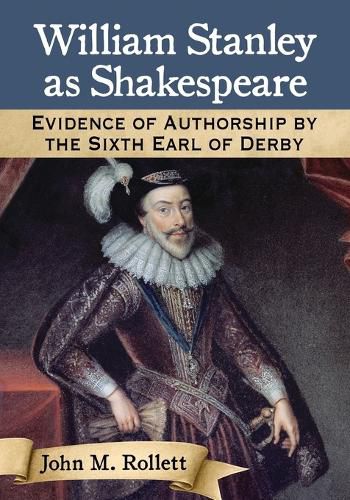Readings Newsletter
Become a Readings Member to make your shopping experience even easier.
Sign in or sign up for free!
You’re not far away from qualifying for FREE standard shipping within Australia
You’ve qualified for FREE standard shipping within Australia
The cart is loading…






This title is printed to order. This book may have been self-published. If so, we cannot guarantee the quality of the content. In the main most books will have gone through the editing process however some may not. We therefore suggest that you be aware of this before ordering this book. If in doubt check either the author or publisher’s details as we are unable to accept any returns unless they are faulty. Please contact us if you have any questions.
My book presents striking new evidence which shows that
William Shakespeare
was the pen-name of William Stanley, younger son of the Earl of Derby, born 1561. He was educated at Oxford, travelled for three years abroad, and studied Law in London, mixing with poets and playwrights; in 1592 Spenser recorded that he had written several plays. In 1594 he unexpectedly inherited the Earldom–hence the pen-name. In 1601 he became a Knight of the Garter, eligible to bear the canopy over King James at his coronation anointing, prompting Sonnet 125’s Wer’t ought to me I bore the canopy?; he is the only authorship candidate ever in a position to bear the canopy (only ever carried over royalty). Love’s Labour’s Lost parodies an obscure poem by his tutor, which few others would have read. Hamlet’s situation closely mirrors Derby’s situation in 1602. His name is concealed in the list of actors’ names in the First Folio. His handwriting matches Shakespeare’s as deduced from the early printed plays. He was patron of players who performed several times at Court, and financed the troupe known as Paul’s Boys. No other member of the upper classes was so thoroughly immersed in everything theatrical.
$9.00 standard shipping within Australia
FREE standard shipping within Australia for orders over $100.00
Express & International shipping calculated at checkout
This title is printed to order. This book may have been self-published. If so, we cannot guarantee the quality of the content. In the main most books will have gone through the editing process however some may not. We therefore suggest that you be aware of this before ordering this book. If in doubt check either the author or publisher’s details as we are unable to accept any returns unless they are faulty. Please contact us if you have any questions.
My book presents striking new evidence which shows that
William Shakespeare
was the pen-name of William Stanley, younger son of the Earl of Derby, born 1561. He was educated at Oxford, travelled for three years abroad, and studied Law in London, mixing with poets and playwrights; in 1592 Spenser recorded that he had written several plays. In 1594 he unexpectedly inherited the Earldom–hence the pen-name. In 1601 he became a Knight of the Garter, eligible to bear the canopy over King James at his coronation anointing, prompting Sonnet 125’s Wer’t ought to me I bore the canopy?; he is the only authorship candidate ever in a position to bear the canopy (only ever carried over royalty). Love’s Labour’s Lost parodies an obscure poem by his tutor, which few others would have read. Hamlet’s situation closely mirrors Derby’s situation in 1602. His name is concealed in the list of actors’ names in the First Folio. His handwriting matches Shakespeare’s as deduced from the early printed plays. He was patron of players who performed several times at Court, and financed the troupe known as Paul’s Boys. No other member of the upper classes was so thoroughly immersed in everything theatrical.